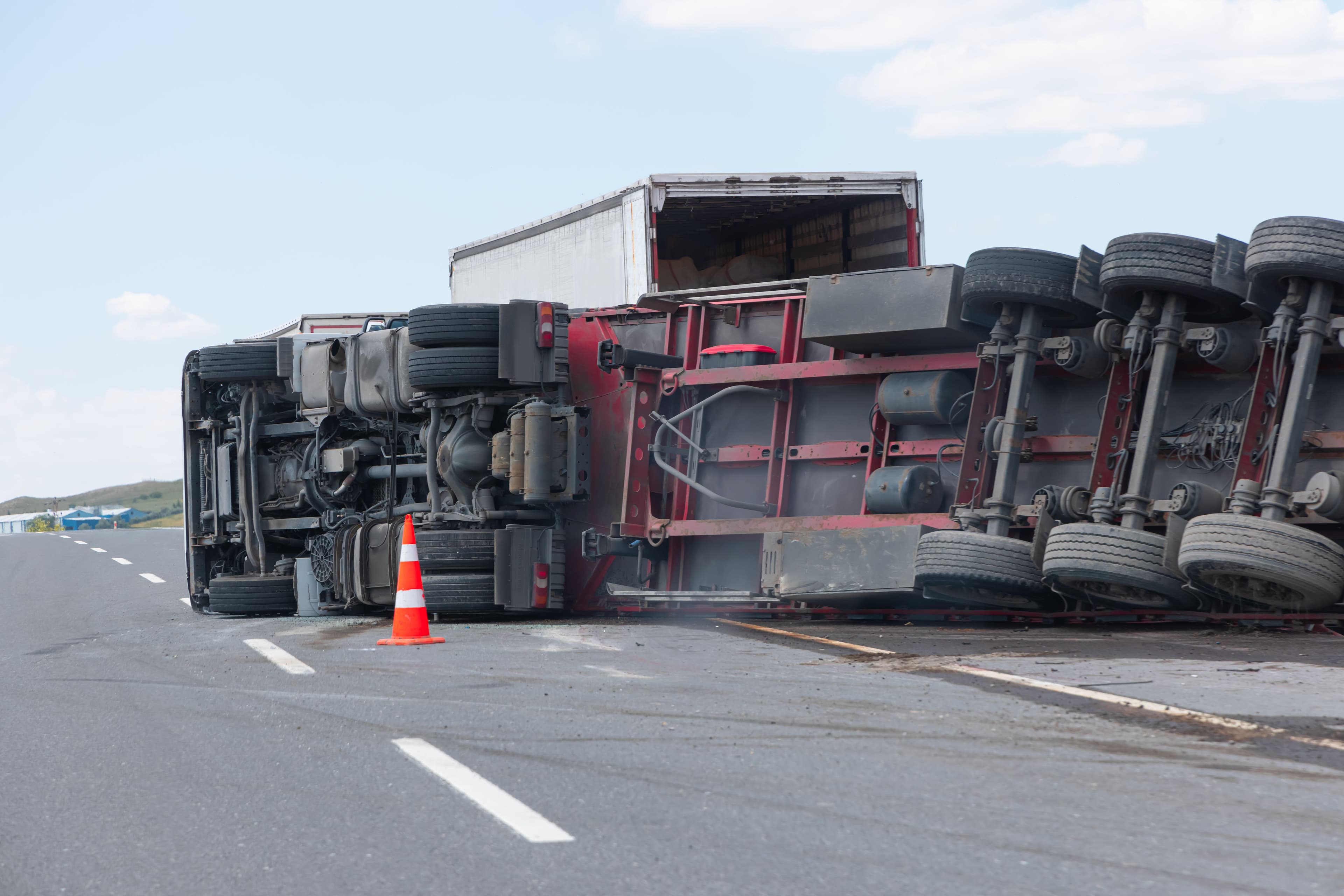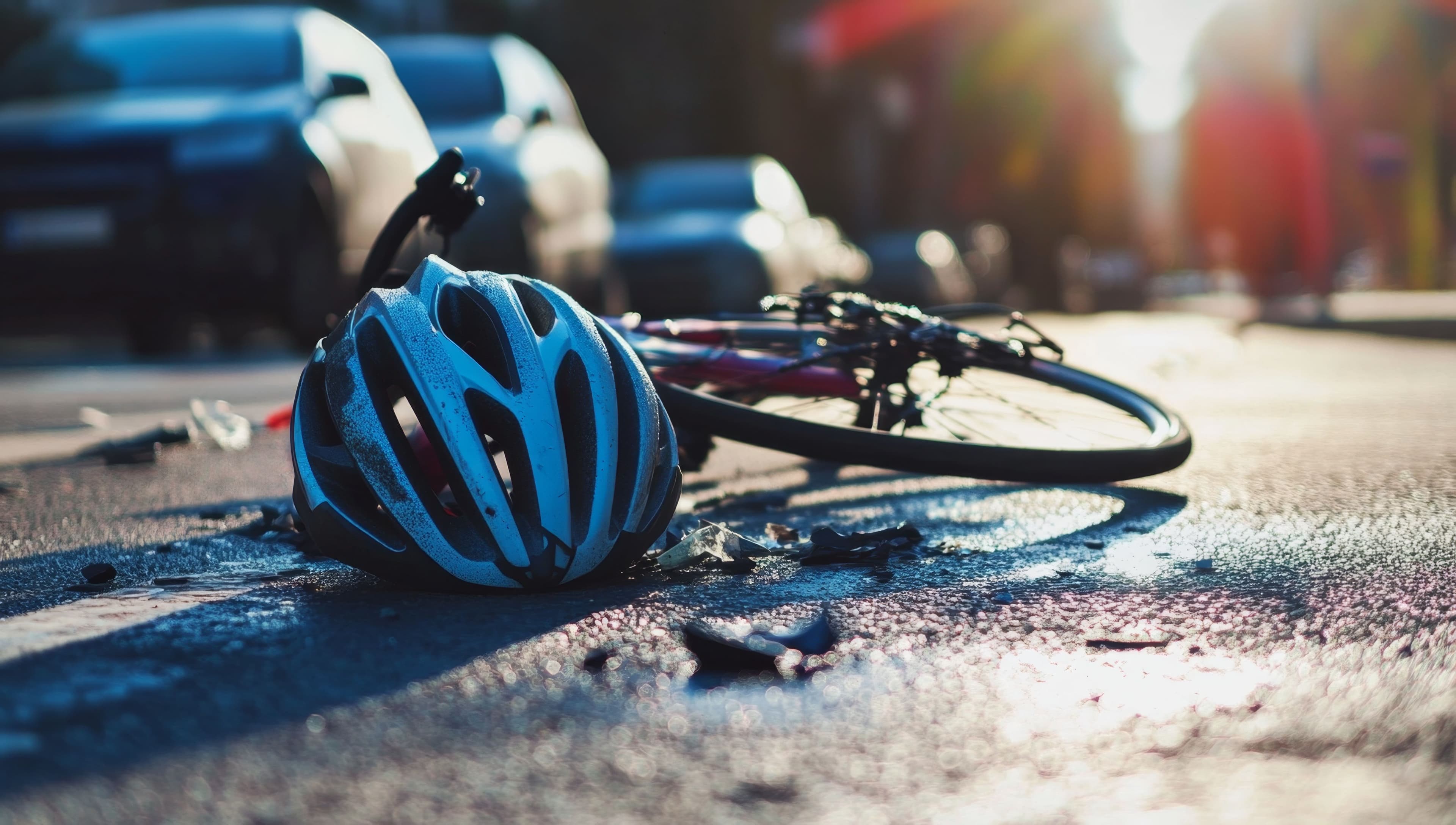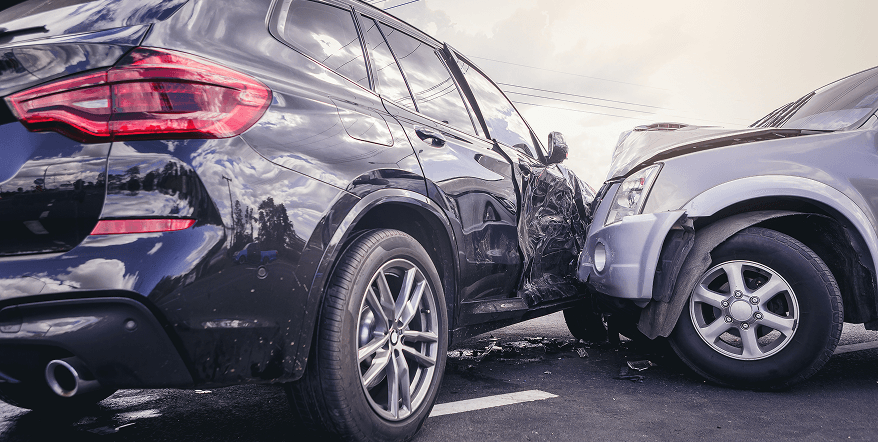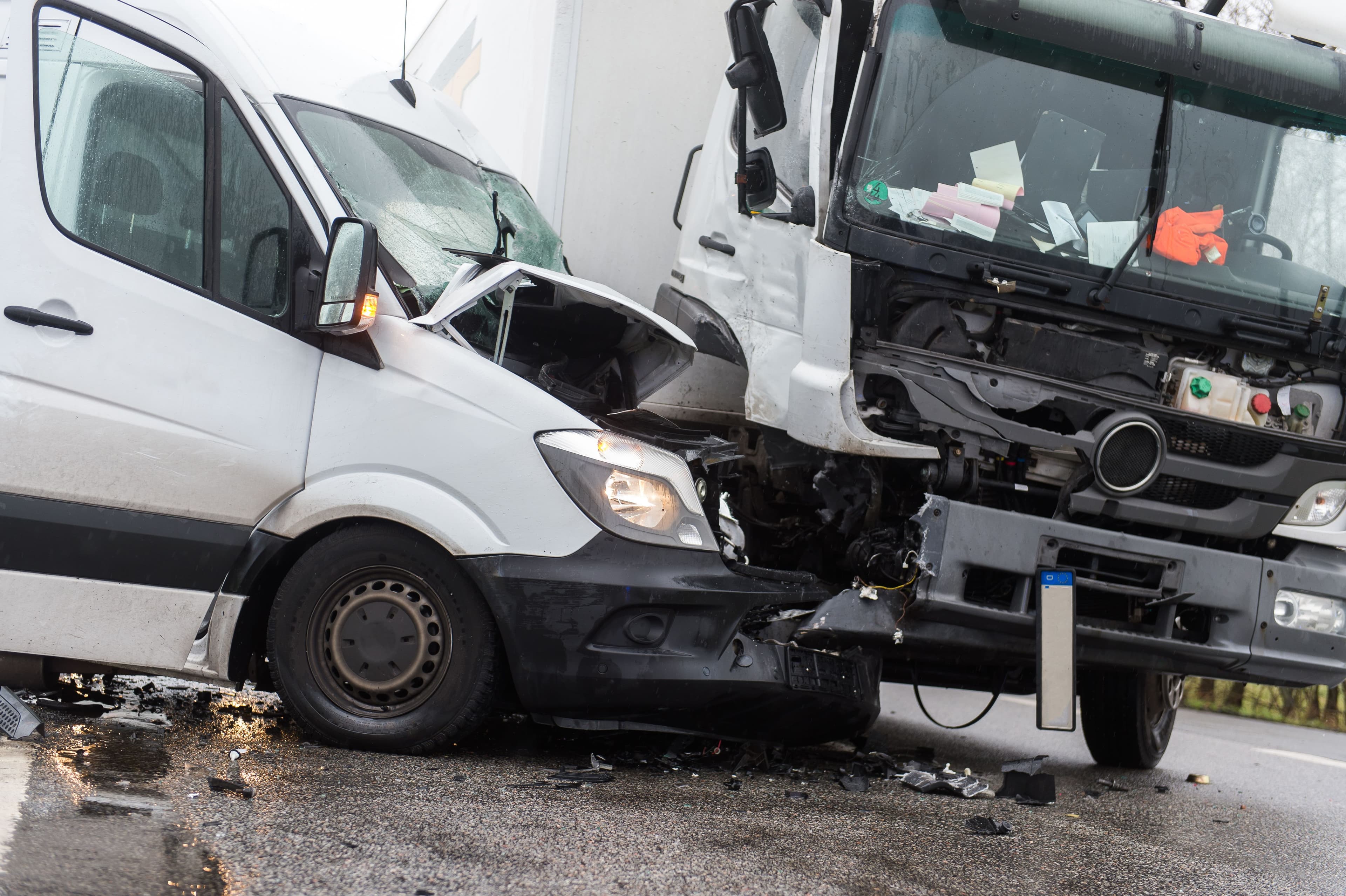In Pennsylvania, truck accident claims are complex because they often involve extremely severe injuries, potential fatalities, serious property damage, multiple liable parties, aggressive commercial insurance companies, and the application of state and federal trucking rules and regulations.
Severe Injuries
Crashes involving large trucks are more likely to cause serious, life-changing injuries. Because of the size and weight difference, a person in a smaller vehicle usually takes the brunt of the damage.
Why Truck Crashes Are More Dangerous
A fully loaded semi can weigh over 80,000 pounds. When it hits a car that weighs a fraction of that, the force is extreme. Even at lower speeds, the injuries are often worse than those in a typical wreck, so people in these crashes often suffer brain injuries, spinal cord damage, broken bones, or internal bleeding. Back and neck trauma is common too.
Some injuries are obvious right away, but others don’t show symptoms until hours or days later and, in the worst cases, someone might lose the ability to walk, speak, or live independently.
Long-Term Impact
These injuries can mean months—or years—of treatment. Some people can’t return to their job. Others need full-time care. It takes a toll on families who are suddenly juggling medical bills, insurance claims, and lost income all at once.
When a Crash Turns Fatal
Truck accidents are more likely to cause deaths, especially on highways. Families left behind have to deal with not only grief, but also funeral costs and major financial strain.
The damage caused by these crashes isn’t just physical. It changes everything about how a person—and their family—moves forward.
Serious Property Damage
When a semi truck hits a smaller vehicle, the weight difference alone is enough to cause major destruction. Even an empty tractor-trailer can weigh over 35,000 pounds, while a loaded one can legally reach up to 80,000. That much force doesn’t just dent a car—it can crush it beyond repair.
As a result, your vehicle might be totaled or need repairs that cost more than it’s worth. In some cases, even if it’s fixable, the damage can lower its value significantly. The impact may also affect nearby property, like fences, buildings, or anything else in the path of the crash.
Because of the scale of destruction, property damage claims in truck accidents are often high. You can request compensation not only for your car, but also for other losses tied to the wreck—especially when that damage is caused by a large commercial vehicle that should’ve been operated with extra caution.
Multiple Liable Parties
In truck accidents, liability often isn’t limited to just one person. Instead, several different parties may share responsibility, depending on how the crash happened and what contributed to it. These cases often require a deeper investigation by our experienced Reading truck accident lawyers to uncover all contributing factors and hold everyone involved accountable.
Truck Drivers
Truckers are often the first ones looked at. They may have been distracted, speeding, or under the influence, or they could have ignored traffic rules like yielding the right of way. In some cases, fatigue plays a role, especially when drivers are on the road longer than they should be.
Some falsify logbooks or rely on substances to stay awake—both serious violations that point to driver negligence.
Trucking Companies
Employers can also be at fault, especially if they hired unqualified drivers, skipped regular maintenance, or violated safety regulations. For example, if a company pressured its drivers to ignore hour limits or overloaded the trailer, they could be held responsible for what happened.
Some companies cut corners to save money and end up putting unsafe vehicles and drivers on the road.
In other situations, the company might fail to address driver complaints or ignore warning signs of misconduct, such as past crashes or drug use. When that happens, their liability increases.
Manufacturers
When a truck part fails, the company that made it might be liable. This could involve defective brakes, steering problems, or other mechanical failures—especially if the defect was known and not addressed. Sometimes, maintenance providers or repair shops are to blame if they installed faulty components or missed issues during inspections.
A full mechanical review of the truck may reveal defects that played a role in the crash.
Other Road Users
Finally, another driver’s careless behavior might have contributed to the crash, which means they may also share liability under Missouri law. For example, a passenger vehicle that cuts off a truck or slams on the brakes suddenly could start a chain reaction.
Pedestrians or motorcyclists might also be involved, depending on the layout of the scene and the cause of the collision.
These cases are rarely straightforward. To get a full picture of what happened—and make sure every liable party is held accountable—you need someone who knows where to look and how to connect the dots.
Our experienced Reading personal injury lawyers will understand how to track down key records from employers, maintenance providers, and manufacturers, and will know how to examine issues like driver fatigue, faulty equipment, or third-party negligence.
Vicarious Liability
Vicarious liability means an employer can be held responsible for a worker’s actions while they’re doing their job, as we mentioned.
In truck accident cases, this often applies when a trucker causes a crash while working for a company. If the driver is on the clock and acting within the scope of their job, it’s usually the employer—not the driver—who’s on the hook for damages.
The logic is that companies benefit from their drivers’ work and should also bear the costs when that work causes harm.
That said, there are exceptions that can complicate things:
Independent Contractors – If the trucker is labeled a contractor, the company might claim they aren’t responsible. But if the company sets the driver’s hours, controls routes, or provides the truck, that “independent” label may not hold up in court.
Personal Use – If the driver was running a personal errand or made an unauthorized detour when the crash happened, the company may argue it’s not liable. But if the driver was still using a company vehicle or following company rules, there may still be a case.
Third-Party Involvement – If another driver played a major role in the crash, the trucking company might try to shift blame to avoid full responsibility. They may argue that the trucker only reacted to someone else’s negligence.
Even when these arguments are raised, they don’t erase your right to seek compensation. In fact, these tactics are often just used to delay or minimize a payout. A lawyer with experience in trucking cases will know how to counter these defenses and hold the right parties accountable.
That includes investigating the driver’s work status, reconstructing the accident, and forcing the company to turn over records they may not offer freely.
Commercial Insurance Policies
Truck accident cases can get complicated fast once insurance comes into play. Unlike regular drivers, truckers usually have commercial insurance—often with higher limits, multiple layers, and different coverage types depending on the situation.
The truck driver’s policy might only cover a small part of your losses, and the rest could fall on the company’s insurer. But figuring out who’s responsible, how much they’re willing to pay, and what coverage applies isn’t always simple.
Because there’s often more money on the line, trucking companies and their insurers push back harder. They have teams focused on protecting their bottom line, and they’ll use a range of tactics to avoid paying you fairly:
- Requesting Recorded Statements Early – These are rarely for your benefit. They look for anything they can twist or take out of context to deny your claim or blame you.
- Pointing Out Delayed Reports – If you didn’t report the crash right away, they may argue your injuries aren’t serious or didn’t happen at all.
- Delaying The Process – The longer they take to investigate, the more pressure they put on you. You may be desperate for money and more likely to accept a low settlement.
- Pushing for Biased Medical Exams – A second medical opinion isn’t always neutral. It’s often from a doctor who regularly works for the insurance company.
- Sending You a Check with Fine Print – A surprise check in the mail may seem helpful, but cashing it could end your claim entirely—even if it’s nowhere near what you’re owed.
- Relying on Experienced Defense Lawyers – These insurers aren’t winging it. They have professionals trained to minimize payouts and drag out cases.
To deal with this, you need someone in your corner who knows how to handle commercial insurance companies and won’t back down.
The Application of State and Federal Trucking Rules and Regulations
When a truck accident happens, the issue isn’t always just about a mistake made on the road. Commercial trucks are governed by strict rules at both the federal and state levels, and these regulations often play a key role in determining who’s at fault.
Federal Oversight Through the FMCSA
The Federal Motor Carrier Safety Administration (FMCSA) sets nationwide standards for how commercial trucking operations must be carried out. These rules apply to drivers, carriers, and even third parties involved in vehicle upkeep and logistics. Violations often show that a crash was preventable.
Some core FMCSA regulations include:
- Hours of Service Limits – Drivers can only stay behind the wheel for a limited number of hours before they’re required to take breaks or time off. These rules aim to reduce fatigue-related accidents.
- Maintenance and Inspection Requirements – Trucks must be inspected regularly, and any mechanical issues have to be addressed right away. Skipping maintenance can lead to dangerous breakdowns on the road.
- Cargo Securement Rules – Improperly loaded or unsecured cargo can shift in transit, throw off the truck’s balance, or spill onto the road, increasing the risk of a serious crash.
- Driver Qualification Standards – Commercial drivers must meet set standards for training, licensing, and background checks. If a company hires an unqualified driver, it may be held accountable.
- Drug and Alcohol Testing – Random, post-accident, and scheduled testing are all required to help catch substance use before it leads to disaster.
Additional State-Level Regulations
On top of federal laws, Missouri imposes its own trucking rules. These may include weight limits on certain roads, requirements for special permits, or additional training mandates. State and federal rules often overlap, but both must be examined closely when building a claim.
Failing to follow even one of these regulations can shift the outcome of a case. Proving a violation—whether by the driver, company, or another party—can directly strengthen your claim for compensation.
Jurisdiction in Cross-State Trucking Accidents
Truck accidents that cross state lines bring added legal complications—especially when it comes to figuring out where a lawsuit should be filed. Jurisdiction can quickly become a sticking point, and choosing the right forum matters more than most people realize.
Where Can the Lawsuit Be Filed?
When a crash involves a truck operating across state borders, there are usually several options for filing suit. A case may be brought:
- In the state where the accident happened
- In the state where the trucking company is based
- In the state where the injured party lives (in some cases)
Each option comes with its own legal considerations. Filing in the wrong jurisdiction can lead to delays or even dismissal, so it’s critical to choose carefully.
Why Jurisdiction Matters
The court where your case is heard can affect everything from which laws apply to how much compensation you’re allowed to recover. Some states cap damages or have different rules around fault. Others may have procedural hurdles that complicate your case. That’s why determining the proper venue isn’t just about convenience—it’s a strategic decision.
Multi-State Defendants and Insurance Companies
Things can get even more complex when multiple parties are involved, each based in different states. Trucking companies, drivers, logistics firms, and insurers may all be headquartered elsewhere, and they may try to move the case to a court more favorable to them. You’ll need to be ready to push back if that move could hurt your chances.
Working With a Lawyer Who Understands Jurisdictional Strategy
Cross-state trucking cases aren’t just about proving what happened on the road. They’re also about knowing where and how to fight. Experienced attorney Tyler Wilk can review the facts, analyze the legal options, and file the case where you’re most likely to get a fair hearing. The earlier you make this call, the better your position will be.
Knowledgeable Pennsylvania Truck Accident Law Firm
At Wilk Law Personal Injury & Car Accident Lawyers, we understand that truck accident cases come with more complexity than most personal injury claims. Between state laws, federal regulations, and multiple potential defendants, the legal path forward isn’t always clear.
That’s why we take the time to investigate every detail thoroughly—from reviewing logbooks and maintenance records to identifying whether a violation of trucking rules played a role. We know how the system works, and we don’t let trucking companies or insurers dodge responsibility when their choices have harmed someone.
Clients across Pennsylvania turn to Wilk Law Personal Injury & Car Accident Lawyers because we bring a practical, committed approach to every case. We don’t hand you off or offer vague promises—instead, we give you informed guidance and build a strategy tailored to your situation.
Whether your case calls for strong negotiation or going to trial, we stay prepared and focused at every stage. If you or someone close to you has been seriously injured in a trucking accident, contact us today for a free consultation.
We’re ready to listen, explain your options clearly, and work hard to help you get the outcome you deserve.
Cities which our attorneys have helped clients with truck accident injury claims include West Chester, Philadelphia, Pottstown, Reading, Coatesville, Downingtown, Exton, Berwyn, and more.
Related Articles
The role of a Pennsylvania truck accident attorney
The importance of evidence in Pennsylvania truck accident claims




